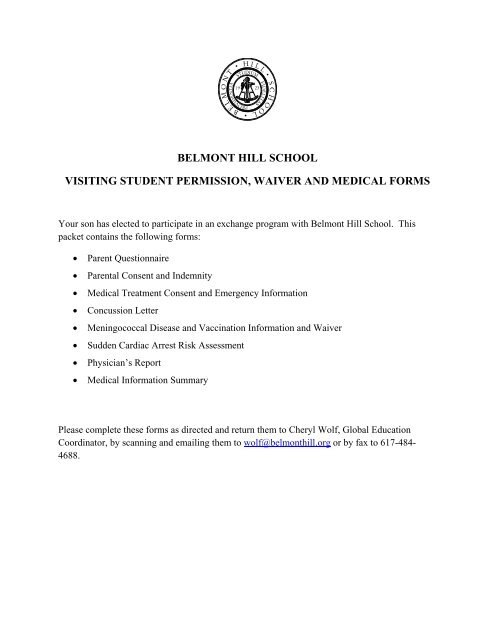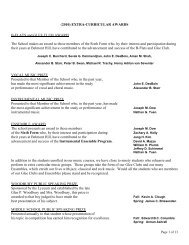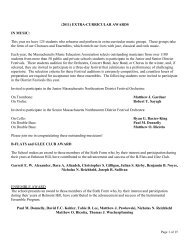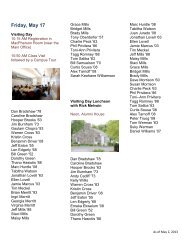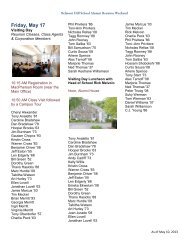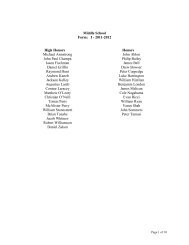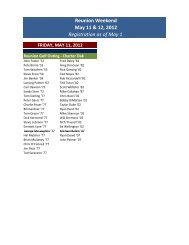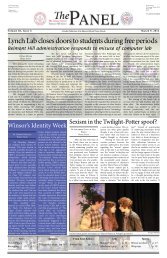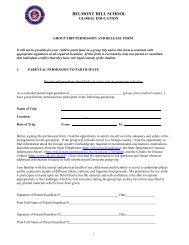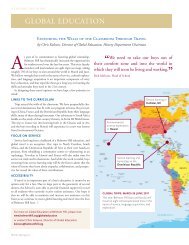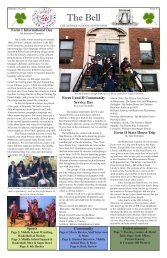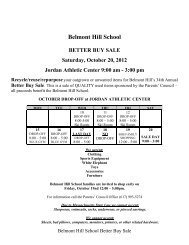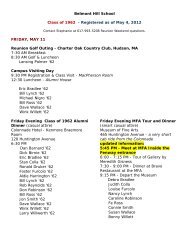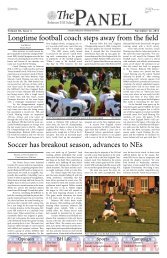belmont hill school visiting student permission, waiver and medical ...
belmont hill school visiting student permission, waiver and medical ...
belmont hill school visiting student permission, waiver and medical ...
You also want an ePaper? Increase the reach of your titles
YUMPU automatically turns print PDFs into web optimized ePapers that Google loves.
BELMONT HILL SCHOOL<br />
VISITING STUDENT PERMISSION, WAIVER AND MEDICAL FORMS<br />
Your son has elected to participate in an exchange program with Belmont Hill School. This<br />
packet contains the following forms:<br />
• Parent Questionnaire<br />
• Parental Consent <strong>and</strong> Indemnity<br />
• Medical Treatment Consent <strong>and</strong> Emergency Information<br />
• Concussion Letter<br />
• Meningococcal Disease <strong>and</strong> Vaccination Information <strong>and</strong> Waiver<br />
• Sudden Cardiac Arrest Risk Assessment<br />
• Physician’s Report<br />
• Medical Information Summary<br />
Please complete these forms as directed <strong>and</strong> return them to Cheryl Wolf, Global Education<br />
Coordinator, by scanning <strong>and</strong> emailing them to wolf@<strong>belmont</strong><strong>hill</strong>.org or by fax to 617-484-<br />
4688.
BOY’S NAME<br />
PLEASE PRINT NAME IN FULL<br />
BELMONT HILL SCHOOL<br />
PARENTAL CONSENT AND INDEMNITY<br />
PLEASE COMPLETE AND SIGN BELOW<br />
MOTHER/GUARDIAN<br />
PLEASE PRINT NAME IN FULL<br />
FATHER/GUARDIAN<br />
PLEASE PRINT NAME IN FULL<br />
I/We do hereby agree <strong>and</strong> consent to my/our son/ward, “the child,” participating in any educational, physical or<br />
extra-curricular activities (“activities is deemed to include transportation to <strong>and</strong> from the activities organized by or<br />
on behalf of Belmont Hill School (“the School”) throughout the course of the child’s enrollment at the <strong>school</strong>.<br />
FURTHER <strong>and</strong> in consideration of the School agreeing to the child’s enrollment <strong>and</strong> allow the child to participate in<br />
activities, I/We hereby:<br />
1. Authorize the School’s teachers, instructors <strong>and</strong> agents to take whatever disciplinary action they deem<br />
necessary to ensure the safety, well-being <strong>and</strong> successful conduct of the child in the activities.<br />
2. Authorize the School’s teachers, instructors <strong>and</strong> agents to obtain any <strong>medical</strong> or dental treatment or<br />
ambulance transport which they deem necessary for the child <strong>and</strong> agree to pay all expenses incurred on<br />
behalf of the child. I/We further authorize qualified <strong>medical</strong> practitioners to take whatever <strong>medical</strong> action<br />
they consider necessary for the child’s welfare <strong>and</strong> well-being.<br />
3. Submit on the enclosed <strong>medical</strong> forms any details which may assist the School to meet the needs of the<br />
child including any condition that may prevent the child from participating in the School’s activities.<br />
4. Recognize that it is my/our responsibility to keep the School informed of any changes which may occur to<br />
the child’s <strong>medical</strong> or physical condition.<br />
5. Agree to:<br />
a. Disclaim all my/our legal rights <strong>and</strong> remedies against the School, its teachers <strong>and</strong> agents, for all<br />
costs, damages or other expenditures incurred by them or on their behalf arising from or in<br />
connection with any claim or dem<strong>and</strong> made by or on behalf of any child or any third party as a<br />
result of any injury, loss or damage (including property damage) where in all circumstances the<br />
staff have not been negligent.<br />
b. Indemnify <strong>and</strong> hold harmless the School, its teachers <strong>and</strong> agents, for all costs, damages or other<br />
expenditures incurred by them or on their behalf arising from or in connection with any claim or<br />
dem<strong>and</strong> made by or on behalf of the child or any third party as a result of any injury, loss or<br />
damage (including property damage) where in all circumstances the staff have not been negligent.<br />
Dated this day of , 20 .<br />
Signature<br />
Signature<br />
[Signature of Mother/Guardian]<br />
[Signature of Father/Guardian]<br />
Witness<br />
Witness
BELMONT HILL SCHOOL<br />
MEDICAL TREATMENT CONSENT & EMERGENCY INFORMATION<br />
This form is an emergency information <strong>and</strong> consent statement that must be completed <strong>and</strong> signed by a<br />
parent or guardian. A <strong>student</strong> will not be permitted to participate in athletics or start classes until all<br />
forms are completed <strong>and</strong> returned to Belmont Hill School.<br />
Student’s Name<br />
Home Address<br />
Last First M.<br />
Street City State Zip<br />
EMERGENCY CONTACTS<br />
Parent#1 Parent #2<br />
Date of Birth ____/____/____<br />
Home Phone (____) Home Phone (____)<br />
Work Phone (____) Work Phone (____)<br />
Cell Phone (____) Cell Phone (____)<br />
Alternate Emergency Contact<br />
Relation Home Phone: (____) Work Phone: (____)<br />
PRIMARY CARE PHYSICIAN<br />
Physician Name<br />
Phone (____)<br />
Address<br />
EMERGENCY MEDICAL INFORMATION<br />
Date of Last Tetanus/Diphtheria (Td or Tdap) ____/____/<br />
(from Physician’s Exam)<br />
Does your son require: Contact Lenses Yes ___ No___ EpiPen Yes ___ No___<br />
Allergies (to food or medication)<br />
Regular medications<br />
Medical conditions/concerns relevant to School attendance or trips away from School:<br />
INSURANCE INFORMATION<br />
Insurance<br />
Policy ID#<br />
Policy Holder<br />
Phone Number (____)
BELMONT HILL SCHOOL<br />
MEDICAL TREATMENT <strong>and</strong> EMERGENCY CONSENT<br />
Student’s Name<br />
Date of Birth ____/____/<br />
I hereby give consent for Belmont Hill School Health Care Providers (the School Nurse <strong>and</strong> Athletic<br />
Trainer), or other Health Care Providers considered appropriate by them, to carry out accepted<br />
procedures for diagnosis, minor <strong>medical</strong> treatment, minor surgical treatment, <strong>and</strong> in-<strong>school</strong> counseling<br />
for my son/ward - unless I specify otherwise in the comments space provided below.<br />
In the event of emergency in which time is an important factor <strong>and</strong> the School is unable to contact me or<br />
an alternate Emergency Contact, I authorize School Health Care Providers, School Officials, or during<br />
athletic competitions, Coaches, or during field trips, Teachers in charge, to exercise their best<br />
judgement, <strong>and</strong> hereby authorize them to approve necessary <strong>and</strong> urgent <strong>medical</strong> or surgical treatment<br />
<strong>and</strong>/or hospitalization in the interest of my son’s/ward’s welfare.<br />
I also give <strong>permission</strong> for <strong>medical</strong> information provided by me to the School to be released to School<br />
Health Care Providers, <strong>and</strong> at their discretion to School Faculty on a limited need-to-know basis, as well<br />
as to other appropriate Health Care Providers who may need this information in order to treat my<br />
son/ward in a <strong>medical</strong> emergency.<br />
Comments:<br />
Date ____/____/____<br />
Signature of Parent or Guardian<br />
School Health Care Provider Notes
Dear Parent/Guardian,<br />
Belmont Hill School is currently implementing an innovative program for our <strong>student</strong>-athletes.<br />
This program will assist your physician <strong>and</strong> the <strong>school</strong>s athletic trainers in evaluating <strong>and</strong> treating<br />
head injuries (e.g., concussion). In order to better manage concussions sustained by our <strong>student</strong>athletes,<br />
we have acquired a software tool called ImPACT (Immediate Post Concussion<br />
Assessment <strong>and</strong> Cognitive Testing). ImPACT is a computerized exam utilized in many<br />
professional, collegiate, <strong>and</strong> high <strong>school</strong> sports programs across the country to successfully<br />
diagnose <strong>and</strong> manage concussions. If an athlete is believed to have suffered a head injury during<br />
competition, ImPACT helps to objectively quantify the severity of head injury <strong>and</strong> when the<br />
injury has recovered to baseline.<br />
The computerized exam is given to athletes before the beginning of <strong>school</strong> to provide a baseline<br />
evaluation of all <strong>student</strong>s. This non-invasive test is set up in “video-game” type format <strong>and</strong> takes<br />
about 30-40 minutes to complete. It is simple, <strong>and</strong> actually many athletes enjoy the challenge of<br />
taking the test. Essentially, the ImPACT test is a preseason physical of the brain. It tracks<br />
information such as memory, reaction time, speed, <strong>and</strong> concentration. It, however, is not an IQ<br />
test.<br />
If a concussion is suspected, the athlete will be required to re-take the test. Both the baseline <strong>and</strong><br />
post-injury test data can be given to your personal physician, neurologist or neuropsychologist to<br />
help evaluate the injury. The test data will enable these health professionals to determine when<br />
return-to-play is appropriate <strong>and</strong> safe for the injured athlete. If an injury of this nature occurs to<br />
your child, you will be contacted with all the details. If a concussive injury occurs in athletics<br />
outside the <strong>school</strong>, your child could be tested as soon as they are back in <strong>school</strong>, if the injury<br />
occurs during the <strong>school</strong> year.<br />
I wish to stress that the ImPACT testing procedures are non-invasive, <strong>and</strong> they pose no risks to<br />
your <strong>student</strong>-athlete. Currently all baseline testing can be done online from any computer with an<br />
internet connection, <strong>and</strong> post injury testing is done with the <strong>school</strong>s AT’s.<br />
We ask that all new incoming <strong>student</strong>s take this test prior to the beginning of the <strong>school</strong><br />
year. Your son would go online <strong>and</strong> type in the following link:<br />
https://www.impacttestonline.com/<strong>school</strong>s (type this link in). Please use the following code to<br />
launch the baseline test WP2TQV2UC8<br />
This link will bring you to Impacts site where you will be able to launch the baseline test. The<br />
<strong>student</strong> would need to select his state <strong>and</strong> follow the directions. On a succeeding page there will<br />
be a drop down menu where they will highlight Belmont Hill School <strong>and</strong> all data will be stored to<br />
be accessed only by the <strong>school</strong>s <strong>medical</strong> personnel. If you have any questions or concerns,<br />
please contact me at either of the following:<br />
Email: dohertye@<strong>belmont</strong>-<strong>hill</strong>.org<br />
Phone (617) 993-5297<br />
Regards,<br />
Ed Doherty, ATC
Information about Meningococcal Disease <strong>and</strong> Vaccination<br />
<strong>and</strong><br />
Waiver for Students at Residential Schools <strong>and</strong> Colleges<br />
Legislation has been enacted in Massachusetts requiring all new <strong>student</strong>s at residential <strong>school</strong>s (e.g., boarding<br />
<strong>school</strong>s) with grades 9-12 <strong>and</strong> postsecondary institutions (e.g., colleges) that provide or license housing to:<br />
1. receive meningococcal vaccine prior to the beginning of classes; or<br />
2. fall within one of the exemptions in the law, which are discussed below.<br />
The law provides an exemption for <strong>student</strong>s signing a <strong>waiver</strong> that reviews the dangers of meningococcal disease<br />
<strong>and</strong> indicates that the vaccination has been declined. To qualify for this exemption, you are required to review<br />
the information below <strong>and</strong> sign the <strong>waiver</strong> at the end of this document. Please note, if a <strong>student</strong> is under 18<br />
years of age, a parent or legal guardian must be given a copy of this document <strong>and</strong> must sign the <strong>waiver</strong>.<br />
What is meningococcal disease<br />
Meningococcal disease is caused by infection with bacteria called Neisseria meningitidis. These bacteria can<br />
infect the tissue that surrounds the brain <strong>and</strong> spinal cord called the “meninges” <strong>and</strong> cause meningitis, or they can<br />
infect the blood or other body organs. In the United States, about 2,600 people each year get meningococcal<br />
disease <strong>and</strong> 10-15% die despite receiving antibiotic treatment. Of those who survive, about 10% may lose limbs,<br />
become deaf, have seizures or strokes, or have other problems with their nervous system.<br />
How is meningococcal disease spread<br />
These bacteria are passed from person-to-person through saliva (spit). You must be in close contact with an<br />
infected person’s saliva in order for the bacteria to spread. Close contact includes activities such as kissing,<br />
sneezing, coughing, sharing water bottles, sharing eating/drinking utensils or sharing cigarettes with someone<br />
who is infected.<br />
Who is at most risk for getting meningococcal disease<br />
People who travel to certain parts of the world where the disease is very common are at risk, as are military<br />
recruits who live in close quarters. Children <strong>and</strong> adults with damaged or removed spleens or an inherited<br />
disorder called “terminal complement component deficiency” are at higher risk. People who live in settings such<br />
as college dormitories are also at greater risk of infection.<br />
Are some <strong>student</strong>s in college <strong>and</strong> secondary <strong>school</strong>s at risk for meningococcal disease<br />
College freshmen living in residence halls or dormitories are at an increased risk for meningococcal disease as<br />
compared to individuals of the same age not attending college. The setting, combined with risk behaviors (such<br />
as alcohol consumption, exposure to cigarette smoke, sharing food or beverages, <strong>and</strong> activities involving the<br />
exchange of saliva), may be what puts college <strong>student</strong>s at a greater risk for infection. There is insufficient<br />
information about whether new <strong>student</strong>s in other congregate living situations (e.g., residential <strong>school</strong>s) may also<br />
be at increased risk for meningococcal disease. But, the similarity in their environments <strong>and</strong> some behaviors<br />
may increase their risk.<br />
The risk of meningococcal disease for other college <strong>student</strong>s, in particular older <strong>student</strong>s <strong>and</strong> <strong>student</strong>s who do<br />
not live in congregate housing, is not increased. However, meningococcal vaccine is a safe <strong>and</strong> efficacious way<br />
to reduce their risk of contracting this disease.<br />
Is there a vaccine against meningococcal disease<br />
Yes, there are currently 2 vaccines available that protect against 4 of the most common of the 13 serogroups<br />
(subgroups) of N. meningitidis that cause serious disease. Meningococcal polysaccharide vaccine is approved<br />
for use in those 2 years of age <strong>and</strong> older. In January 2005, a new type of meningococcal vaccine was licensed,<br />
called meningococcal conjugate vaccine, <strong>and</strong> is currently only approved for use in those 11- 55 years of age.<br />
Both types of meningococcal vaccines are acceptable for college <strong>student</strong>s <strong>and</strong> residential <strong>school</strong> <strong>student</strong>s 11<br />
years of age <strong>and</strong> older. For those younger than 11 years of age, meningococcal polysaccharide vaccine is the<br />
only licensed vaccine.<br />
Both of the vaccines provide protection against four serogroups of the bacteria, called groups A, C, Y <strong>and</strong> W-<br />
135. These four serogroups account for approximately two-thirds of the cases that occur in the U.S. each year.<br />
Most of the remaining one-third of the cases are caused by serogroup B, which is not contained in the vaccine.<br />
Protection from immunization with the meningococcal polysaccharide vaccine is not lifelong; it lasts about 3 to 5<br />
years in healthy adults (some people may be protected longer.) The meningococcal conjugate vaccine is<br />
expected to help decrease disease transmission <strong>and</strong> provide more long-term protection.
Is the meningococcal vaccine safe<br />
A vaccine, like any medicine, is capable of causing serious problems such as severe allergic reactions. The risks<br />
associated with receiving the vaccine are much less significant than the risks that would arise in a case of<br />
meningococcal disease. Getting meningococcal vaccine is much safer than getting the disease. Some people<br />
who get meningococcal vaccine have mild side effects, such as redness or pain where the shot was given.<br />
These symptoms usually last for 1-2 days. A small percentage of people who receive the vaccine develop a<br />
fever. The vaccine can be given to pregnant women.<br />
Is it m<strong>and</strong>atory for <strong>student</strong>s to receive meningococcal vaccine prior to entering secondary <strong>school</strong>s or<br />
colleges that provide or license housing<br />
Massachusetts law (MGL Ch. 76, s.15D)) requires new <strong>student</strong>s at residential <strong>school</strong>s (e.g., boarding <strong>school</strong>s)<br />
with grades 9-12 <strong>and</strong> new full- <strong>and</strong> part-time, undergraduate <strong>and</strong> graduate <strong>student</strong>s in degree-granting programs<br />
at postsecondary institutions (e.g., colleges) that provide or license housing to receive meningococcal vaccine.<br />
At affected institutions, the new requirements apply to all new <strong>student</strong>s, regardless of grade (including grades<br />
pre-K through 8), year of study, <strong>and</strong> whether or not they reside in <strong>school</strong>- or campus-related housing. Beginning<br />
in August 2005, all new <strong>student</strong>s at these institutions must provide documentation of having received<br />
meningococcal vaccine (within the last 5 years) at least 2 weeks prior to the beginning of classes, unless they<br />
qualify for one of the exemptions allowed by the law.<br />
Students may begin classes without a certificate of immunization against meningococcal disease if: 1) the<br />
<strong>student</strong> has a letter from a physician stating that there is a <strong>medical</strong> reason why he/she can’t receive the vaccine;<br />
2) the <strong>student</strong> (or the <strong>student</strong>’s parent or legal guardian, if the <strong>student</strong> is a minor) presents a statement in writing<br />
that such vaccination is against his/her sincere religious belief; or 3) the <strong>student</strong> (or the <strong>student</strong>’s parent or legal<br />
guardian, if the <strong>student</strong> is a minor) signs the <strong>waiver</strong> below stating that the <strong>student</strong> has received information about<br />
the dangers of meningococcal disease, reviewed the information provided <strong>and</strong> elected to decline the vaccine.<br />
Consideration is being given to amending the law regarding the <strong>student</strong>s to be covered by the requirement.<br />
When <strong>and</strong> if the law is amended, regulations regarding meningococcal vaccination may change.<br />
Where can a <strong>student</strong> get vaccinated<br />
Students <strong>and</strong> their parents should contact their healthcare provider <strong>and</strong> make an appointment to discuss<br />
meningococcal disease, the benefits <strong>and</strong> risks of vaccination, <strong>and</strong> the availability of this vaccine. Schools <strong>and</strong><br />
college health services are not required to provide you with this vaccine.<br />
Where can I get more information<br />
• Your healthcare provider<br />
• The Massachusetts Department of Public Health, Division of Epidemiology <strong>and</strong> Immunization at (617)<br />
983-6800 or www.mass.gov/dph<br />
• Your local health department (listed in the phone book under government)<br />
________________________________________________________________<br />
Waiver for Meningococcal Vaccination Requirement<br />
I have received <strong>and</strong> reviewed the information provided on the risks of meningococcal disease <strong>and</strong> the risks <strong>and</strong><br />
benefits of meningococcal vaccine. I underst<strong>and</strong> that Massachusetts’ law requires <strong>student</strong>s enrolled at<br />
secondary <strong>school</strong>s, colleges <strong>and</strong> universities that provide or license housing to receive meningococcal<br />
vaccinations, unless the <strong>student</strong>s provide a signed <strong>waiver</strong> of the vaccination or otherwise qualify for one of the<br />
exemptions specified in the law.<br />
After reviewing the materials above on the dangers of meningococcal disease, I choose to waive receipt of<br />
meningococcal vaccine.<br />
Student Name:<br />
Student ID or SSN:<br />
Date of Birth:<br />
Today’s Date:<br />
Signature:<br />
(Student or parent/legal guardian, if <strong>student</strong> is under 18 years of age)<br />
Provided by:<br />
Massachusetts Department of Public Health / Division of Epidemiology <strong>and</strong> Immunization / 617-983-6800<br />
MDPH Meningococcal Information <strong>and</strong> Waiver Form March 2005
BELMONT HILL SCHOOL<br />
SUDDEN CARDIAC ARREST RISK ASSESSMENT<br />
STUDENT’S NAME: ____________________________ FORM: ____<br />
Patient history questions YES NO<br />
Has your child ever fainted or “passed out” DURING exercise,<br />
emotional upset or after being startled<br />
Has your child ever fainted or “passed out” AFTER exercise<br />
Has your child had extreme fatigue associated with exercise<br />
(different than other children)<br />
Has your child ever had unusual or extreme shortness of breath<br />
during exercise<br />
Has your child ever had discomfort, pain or pressure in his chest<br />
during exercise<br />
Has your child ever been diagnosed with an unexplained seizure<br />
disorder<br />
Family history questions YES NO<br />
Are there any family members who had an unexpected,<br />
unexplained death before age 50 (including sudden infant death<br />
syndrome, car accident, drowning, etc)<br />
Are there any family members who died from, or been diagnosed<br />
with heart problems before age 50<br />
Are there any family members who have had unexplained fainting<br />
or seizures<br />
If you have answered “yes” to any of the above questions, please explain<br />
your answer here:<br />
Parent signature: ________________________________ Date:__________<br />
If you answered “yes” to any of the above questions, your child’s primary<br />
care provider should check his heart, <strong>and</strong> sign this document.<br />
I, the primary care provider have performed a cardiovascular exam <strong>and</strong> risk<br />
factor assessment on this patient:<br />
Physician’s Signature: ____________________________<br />
Date: _______
BELMONT HILL SCHOOL<br />
PHYSICIAN'S REPORT<br />
This form is to be filled out by your son's physician <strong>and</strong> returned to the School.<br />
The Health Clinic will be available to all <strong>student</strong>s for all health matters while<br />
<strong>school</strong> is in session.<br />
STUDENT'S NAME:<br />
AGE____ FORM _____<br />
DATE OF EXAMINATION: (__________________)<br />
Height: _____________ Ears: ____________ Heart: ______________<br />
Weight: ______________ Eyes: ____________ Lungs: _____________<br />
Blood Pressure: ________ contacts: ________ Neurological: ________<br />
Pulse Rate: ____________ glasses: _________ Teeth: ______________<br />
POSTURAL SCREENING:<br />
Diagnosis: Normal Therapy:<br />
Observation:<br />
Scoliosis:<br />
Bracing:<br />
Lordosis:<br />
Other:<br />
Kyphosis:<br />
LABORATORY FINDINGS: (optional)<br />
Hemaglobin: _______ Urinalysis: ____________<br />
Hematocrit: ________ Cholesterol: ___________<br />
Recent immunizations (include most recent tetanus booster or Td): _________<br />
(Meningococcal Vaccine is strongly recommended)<br />
Note: Belmont Hill School is an international compository, with <strong>student</strong>s <strong>and</strong><br />
faculty traveling all over the world, sometimes to areas endemic of TB; every year<br />
we pick up new cases of exposure.<br />
Recent TB mantoux test: _______/_________ (required for all new <strong>student</strong>s, as<br />
Date Result well as those with an elevated risk<br />
of exposure. Check w/physician)<br />
I have examined this <strong>student</strong> <strong>and</strong> find him to be free of any communicable disease.<br />
There are no apparent contraindications to his participating in routine <strong>and</strong><br />
competitive <strong>school</strong> sports <strong>and</strong> activities except as noted below:<br />
Date: ________Signed:_______________________________________________<br />
Physician's Name: ___________________________________________________
Medical Information Summary<br />
(Please attach a copy of the <strong>student</strong>’s most recent physical exam)
MEDICAL INFORMATION SUMMARY<br />
(to be completed by parent )<br />
STUDENT’S NAME<br />
Form<br />
The following information will help us in providing the best possible care for your son. Please<br />
consider each question – <strong>and</strong> answer to the best of your knowledge.<br />
HEALTH HISTORY:<br />
YES NO<br />
Allergy<br />
Asthma<br />
Fainting/Convulsions<br />
Heart Murmur / Problems<br />
Rheumatic Fever<br />
Kidney Disease<br />
Chronic Sprains, strains, dislocations<br />
Fractures<br />
Surgery<br />
Loss of a paired organ<br />
Concussion<br />
Mononucleosis<br />
Diabetes<br />
If “YES” to any of the above, please explain <strong>and</strong> give dates:<br />
Please list regular <strong>and</strong>/or periodic medications <strong>and</strong> reason for taking them: (for example:<br />
Accutane, insulin, Ritalin, Prozac)<br />
There are occasions when a <strong>school</strong>’s ability to respond optimally to <strong>student</strong>s is affected by<br />
knowledge of their mental health problems <strong>and</strong> therapy.<br />
Are there any identifiable mental health concerns in your son or in your family<br />
Yes________ No________<br />
Does your son see a mental health counselor If so, please give name:<br />
Failure to disclose to the School pertinent information regarding your son’s <strong>medical</strong> history,<br />
including medications, may jeopardize your son’s care <strong>and</strong> treatment. Discretion will be used in<br />
sharing this information. If you feel strongly about not sharing something in particular, please<br />
note on this sheet, or call Donna David (nurse) 617-993-5335.<br />
Date:<br />
Signature of Parent


